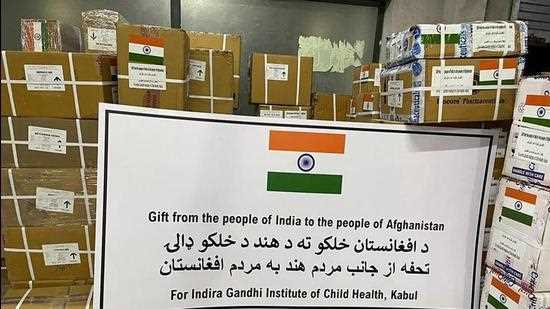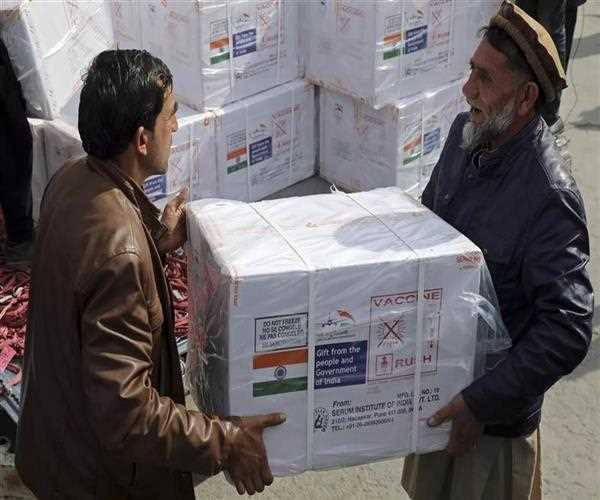
24-Jun-2022
INDIA PROVIDES ASSISTANCE TO AFGHANISTAN AFTER THE DEVASTATING EARTHQUAKE
India is a country where people value collaboration and keep positive connections with their neighbours. India has always been regarded as a 'nation that loves peace.' Most countries have official political ties with India. India is regarded as the democratic second-most populous nation in the world. The world's fastest-growing economy is in this country. India is becoming more powerful internationally and has a significant voice in world commerce.
India is a developing industrialised country. It has a history of collaboration with several nations.
India's foreign policy has traditionally seen the idea of a neighbourhood as a set of expanding concentric circles centred on a core axis of shared historical and cultural experiences. Millions of individuals with Indian ancestry reside and work overseas, serving as a vital link to their homeland. Assuring their well and well-being within the confines of the laws of the nation in which they reside has been a key component of Indian foreign policy.
The desire to assist underprivileged neighbours and promote goodwill are two important justifications for helping. The core of Indian philosophical and cultural beliefs is also help and support. Major faiths in India that advocate charity and solidarity with the underprivileged include Hinduism, Buddhism, and Islam. Daan has a very unique place in Hindu mythology. There should be no incentive for charitable giving, according to the revered Hindu text known as the Bhagavad Gita. The MEA of India views helps as a 'goodwill gesture.' The relationship between India and its neighbours may be seen within the larger perspective of globalisation and hegemony. India is working to create strategic political and economic alliances at the bilateral and regional levels, free from the structural constraints of the Cold War, with the hope of reaping significant security benefits.
Several developing nations, including Nepal, Bhutan, Afghanistan, Sri Lanka, Bangladesh, and Pakistan, have received help from India.
Frequently providing loans, medical supplies, and other forms of support, India is also very involved in humanitarian causes and disaster relief. Because of its assistance with disaster relief in Sri Lanka, Afghanistan, and Myanmar, the Brookings Institute even dubbed the country 'The Neighborhood First Responder.' After Cyclone Winston struck the country in 2016, humanitarian help was sent to countries like Fiji. India recently provided financial aid, food donations, and vaccine distribution to help fight the COVID-19 epidemic. Brazil, which has a lack of vaccines, just got 2 million doses from India.
India has provided Afghanistan with various services, including training, humanitarian aid, rehabilitation, improved public transit, the provision of planes and other military equipment, and oversight of food aid. India has increased its contributions to Afghanistan since the Taliban were ousted from power. Small Development Projects (SDPs) were how India was carrying out its aid programme in Afghanistan (SDPs). India had constructed a number of basic health clinics, schools, and children's hospitals under the first two of the SDP's three stages, and it had also dug borewells throughout the Afghan border districts.
A 6.1-magnitude earthquake just struck Afghanistan, leaving many dead and countless others seriously injured. India has pledged to help the people of Afghanistan in their hour of need after the earthquake caused many people to lose their homes and be displaced.
Four districts in Patika province—Gayan, Barnala, Naka, and Ziruk—as well as Spera district in Khost province have been seriously hit by the 6.1 magnitude earthquake that slammed the Central Region of Afghanistan early on Wednesday morning, June 22.
At a June 23 Security Council briefing and consultations on Afghanistan, India's Permanent Representative to the UN Ambassador T. S. Tirumurti said, 'At the outset, I express our deepest condolences to the victims and their families, as well as to all those impacted by the devastating earthquake in Afghanistan.
He added, 'India feels the sorrow of the people of Afghanistan and is ready to lend support and help in this hour of need.
The first shipment of India's quake relief aid for the people of Afghanistan has arrived in Kabul and has been delivered by the Indian team there, according to a tweet from the ministry of external affairs spokesperson Arindam Bagchi. He said, 'Further consignment also follows.'
According to the United Nations Office for the Coordination of Humanitarian Affairs (OCHA), the earthquake was recorded at a depth of 10 kilometres.
The earthquake has caused at least 1,000 deaths, several thousand homeless persons, and approximately 2,000 demolished dwellings. OCHA is organising the emergency response on behalf of UN organisations and humanitarian partners.
Assuring that the Security Council would continue to exercise its oversight to prevent any potential misappropriation of funds and abuse of exemptions from sanctions, Tirumurti stated that India had supported Security Council Resolution 2615, which provided for humanitarian assistance to Afghanistan. We trust that the UN agencies and their assistance partners would fully utilise the 'humanitarian carve-outs' of this Resolution and resolve any anomalies, he said.
India has sent out multiple shipments of humanitarian aid, including 30,000 metric tonnes (MT) of wheat, 13 tonnes of medications, 5,00,000 doses of the COVID-19 vaccine, and winter clothes, in response to the needs of the Afghan people.
These humanitarian shipments were sent to the World Food Program and the World Health Organization as well as the Indira Gandhi Children's Hospital in Kabul (WFP).
The Government of India signed a contract with the WFP for the distribution of 50,000 MT of wheat within Afghanistan in order to guarantee a fair and reasonable distribution of India's wheat aid. He added that the delivery of this wheat to Afghanistan has already begun.

A team from India visited Kabul on June 2-3 and met with representatives of the international organisations involved in the distribution of the humanitarian aid in order to monitor the use of the country's medical and food-grain assistance and to further assess the humanitarian needs of the Afghan people.
The crew also went to locations where Indian programmes and initiatives are being carried out, including the WFP wheat distribution centre, Habibia High School, Chimtala Sub-Power Station, and Indira Gandhi Children Hospital.
“We are now in the process of shipping more medical assistance and food grains to Afghanistan. We also gifted one million doses of India’s COVAXIN COVID-19 vaccines to Iran to administer to the Afghan refugees in Iran. In addition, we have assisted UNICEF by supplying almost 60 million doses of polio vaccine and two tonnes of essential medicines,” he said.
Tirumurti reaffirmed the need for humanitarian aid to be based on impartiality, independence, and neutrality. Humanitarian help should be distributed in a non-discriminatory manner and be available to everyone, regardless of racial origin, religious preference, or political affiliation. The most vulnerable people, such as women, children, and minorities, should receive aid first.
He said India will continue to play its part in the pursuit of that goal and the interests of the Afghan people will continue to be at the centre of our efforts in Afghanistan, noting that peace and security in Afghanistan are crucial imperatives that the international community needs to strive for jointly.
He emphasised that India has direct interests in seeing that Afghanistan regains its peace and stability as a contiguous neighbour and longtime ally.
“We are quite worried about recent events in Afghanistan, particularly the deteriorating humanitarian situation, because of our great historical and cultural ties to the Afghan people, he added. Tirumurti emphasised that India's strategy toward Afghanistan will, as always, be determined by its particular relationship and long-standing affinity with the Afghan people”, he said.
India is still pushing for an inclusive government in Afghanistan that reflects all facets of Afghan society on the political front. For both local and foreign participation, a broad-based, all-encompassing, and representative formation is required,' he continued.
“We are deeply concerned about recent developments in Afghanistan which directly impact women and girls of Afghanistan. There has been an increasing attempt towards removing women from public life in Afghanistan. We join others in calling for ensuring the protection of rights of women and girls and to ensure that the long-fought gains of the last two decades are not reversed,” he added.

Student
current post-graduate student at christ university and an aspiring content writer with experience in working on online content creation and research..
Comments
Join Our Newsletter
Subscribe to our newsletter to receive emails about new views posts, releases and updates.
Copyright 2010 - 2026 MindStick Software Pvt. Ltd. All Rights Reserved Privacy Policy | Terms & Conditions | Cookie Policy